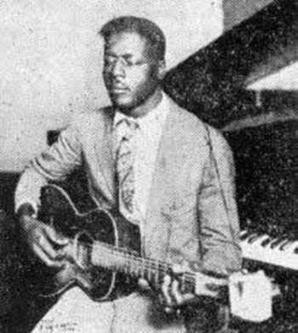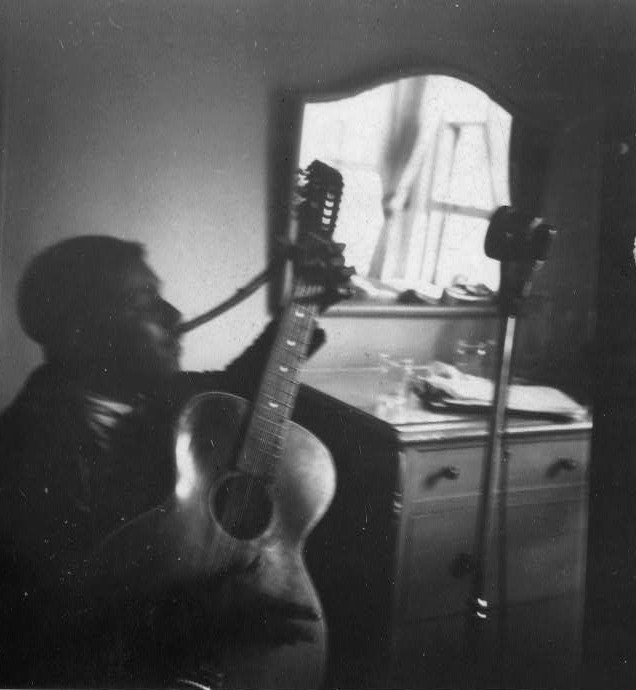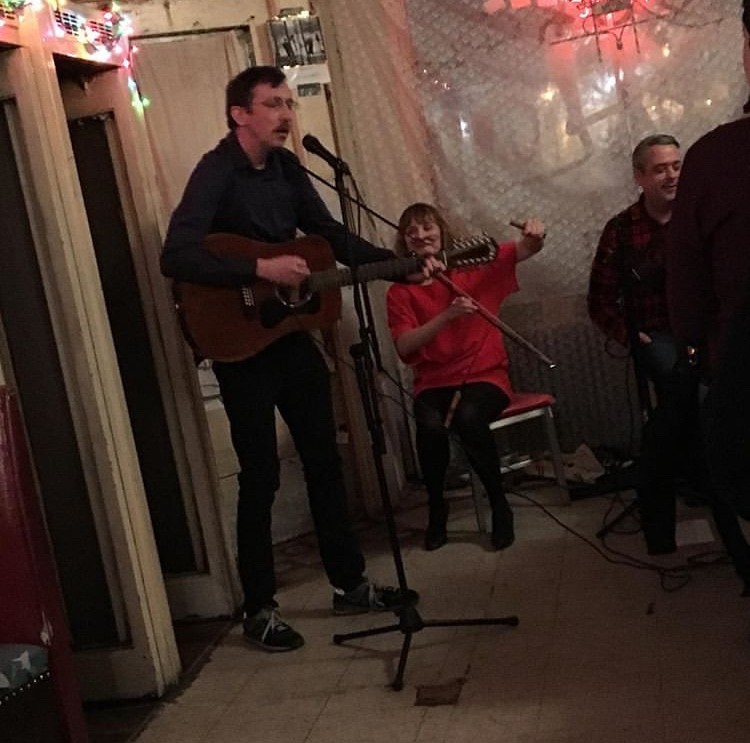Navigating the Distance Between Music and Poetry

I began taking guitar lessons when I was nine, shortly after my dad died. It was a positive experience during a rough time, and I always enjoyed it. I learned the basics of musical knowledge and some very elementary classical pieces. After a few years, I advanced to learning blues and jazz compositions, such as the intro to “Blue Monk” by Thelonious Monk, and “Hesitation Blues,” a standard, both of which I still like to play. I performed in recitals at my music school. I had started writing poems when I was eight but had no thought of writing songs or trying to make a connection between the two.
When I was 15 or 16, I began listening to Bob Dylan. I remembered his records playing in our apartment, and I associated that with my dad. I was aware that Dylan was sometimes engaging a poetic space in his songs, but I also could see that he wasn't writing poetry. All the same, Dylan clearly demonstrated a handle on cut-up, absurdity, and displacement in lines like “The post office has been stolen/and the mail box is locked” from the song "Stuck Inside of Mobile with Memphis Blues Again." I began earnestly reading my dad's poems in this same time period, and made a connection, though not one I could articulate, between Dad's book, The Sonnets, Ron Padgett's Great Balls of Fire, and a trip to the Museum of Modern Art, where I saw several cubist paintings by Picasso and Braque. It was a breakthrough for me to recognize that similar kinds of maneuvers can be achieved across different mediums. It happened very fast. Mom and I had only been in the museum for a short amount of time, but it was so startling that I instantly needed to leave in order to process it.
I went to college at SUNY Purchase, on my own for the first time, and I began to engage the depths of loneliness that had been opened by loss. Dad had been gone for more than half of my life, but my conversation with who I was in relation to him was never more intense. Other deaths had followed his, and I needed a break. I lacked confidence, and at times I felt that I could hardly move. I had wanted to study poetry, but I already had more access to examples of contemporary poetry than I thought most institutions would provide. Why study Stephen Crane, when I could go visit John Godfrey? I had instead chosen a school where I could surround myself with creative people from other disciplines. Purchase had strong departments for music, dance, visual arts, and theatre. But I hated going to class—I was ready for some space, and some privacy, which was scarcely afforded growing up in a family of four in a four-room railroad apartment.
I stopped going to classes for a while, but eventually found my way back, too late to salvage all of them. I aced my Latin American poetry class, barely survived Human Physiology and Nutrition, and failed two others. There was a final scheduled for one of those classes that I knew I had no chance for, so I skipped it. I went instead to the campus library and took out a copy of Dante's The Divine Comedy, and sat reading it for hours that day, finishing it in subsequent days. At one point I put it down, and in despair picked up my guitar, but couldn't even manage to tune it. It was the same classical guitar that I had taken lessons with. I kept playing anyway, realizing that the joy I got from it was more important than my lack of finesse. I decided to give myself a break, and not to worry about my skill level... for 10 years. Surely, I'd be better by then, closer to the player I wanted to be.
In other visits to the campus library, I discovered a treasure trove of music. I checked out blues records by Mississippi John Hurt, and a compilation from a folk festival that included songs by Big Bill Broonzy, Sonny Terry and Brownie McGhee, Lead Belly, and Lightnin' Hopkins. I made cassette copies of those recordings and also checked out songbooks by Dylan, Joan Baez, and collections of folk songs, trying to learn as many songs as I could. When I was down in New York City, I'd go to Carl Fischer's at Astor Place and pore through the books of sheet music. I couldn't afford to buy the books most of the time, so I'd look up the songs I wanted to learn, memorize the chords, and then go outside and write them down on my notebook or sometimes just on my hand.
I mined Dylan's catalogue, looking for songs with chords I didn't know, but really hit the jackpot with a book of Tom Waits songs that had been written on piano but in the book were transcribed for guitar. The songs are full of weird chords, diminished sevenths, chords with math equations in superscript, and hand positions that I had not even considered. I began learning Velvet Underground songs—my dad seemed to have had a friendship with Andy Warhol in the 60s, who produced their first album. Lou Reed also engaged poetic practices in his early lyrics. I followed Dylan further into the blues. He sang a song about Blind Willie McTell, and one strange day when I was escaping Purchase for a moment, I wandered into the Galleria Mall in White Plains and found a cassette by McTell called Atlanta Twelve String. The album was recorded in the late 40s and was so much crisper and clearer than the earlier depression-era blues recordings I had heard. I read about the folk/blues revival of the 60s, and studied liner notes from the albums, leading me to music by Elizabeth Cotten, Memphis Minnie, Blind Willie Johnson, Skip James, and a host of others. I began attempting to learn how to fingerpick John Hurt's songs. This was by no means a unique thing to be doing, but the information was exciting and the music was revelatory and offered articulations of grief. Culturally my life didn't seem to be anything like these men and women, but I did have the blues. Even if, as Lead Belly spoke in his song "Good Morning Blues," "Once there was a white man who had the blues, he had nothing to worry about."
The sound of McTell's acoustic twelve-string was robust and full of life, his fingerpicking work was beyond what I could conceive, and his voice also stood out, though it's hard to pinpoint exactly why. Maybe it was just that I could hear it. Charlie Patton or Blind Lemon Jefferson, for example, recorded in the late 20s—"race records" is how those recordings were referred to, marketed to African-Americans. Patton and Jefferson were considered masters, but the recordings were hard to parse as the original reels degraded over time. They sounded like they were singing underwater. I discovered later that a lot of earlier recordings were sped up by the engineers, adding to the otherworldly quality of the sound. Atlanta Twelve String benefitted from being recorded at a time when the technology had evolved, but age had not diminished McTell's skill. His voice was very clear, and his lyrics easy to understand. He sounded like one of my New York City neighbors, and his handling of phrases was down to earth, though the lyrics themselves had an amazing use of slang, as shown in songs like "Razor Ball":
Now come over to the counter honey check your hat,
you can't reel and rock right off the bat,
you've got to hard-hard
when you're twisting this Razor Ball
The song seemed to refer to dancing, or maybe drinking. It didn't matter, I related more to ambiguity at this point than to pristine moments of isolated understanding. When it came to more well known, traditional material like "I've Got to Cross The River Jordan," McTell would often drop lyrics and replace them with a slide riff. The effect of the dropped lyrics reminded me of the poetic disjunction in The Sonnets, and also somehow of the strange partial images of cubist paintings, that left just enough of the overall structure. Here's my own transcription of his rendition, with ellipses designating slide passages:
I got to cross that ...
I got ... old Jordan
Nobody here can ...
Lord I got to ... River of Jordan
That Jordan River is cold and chilly
Lord I got, I got to cross it
Nobody ... can ....
Lord I got to ... chilly Jordan
Then I got to love in some ...
Lord I got ... in the grave yard ...
Nobody ... can ...
Lord I got to ... in that cold place
Then I got to meet my ...
Lord I got to meet my savior ...
Nobody ... can ....
So Lord I got to ... my father ...
Then I got to stand my ...
Lord I got ... my trials ...
Nobody can ...
So Lord I got ... in the judgement
Yet I got to wade that ...
Lord I got ... chilly Jordan ...
Nobody ... can ...
So Lord I got to ... deep water ...
Lord I got to walk that lonesome journey
Lord I got ... tedious journey...
Nobody ... can ...
Lord I got to ... O Lordy ...
So now I got to cross cross cross that ...
Lord I got ... Jordan ...
Nobody ... can ...
Lord I got to ... Chilly Jordan
The displacement is stunning, yet accurate enough to show the overall structure, and the slide riffs give a map as to what the missing lyrics might be. To have such confidence in the projection of the lyrics, and to back it with master slide playing, seemed to prove Dylan's lyric true: "No one can sing the blues like Blind Willie McTell."
During my third year in college, my cousin Will Yackulic enrolled. He was studying painting, but also played guitar. We formed a band with our friend, Aom Isbell, and called ourselves 3 Guys Plummeting. We had four or five songs and managed to get one gig on campus. We had a one-chord song about Andy Warhol, whose main determinant was that it last at least 45 minutes. We didn't play that one at the show. The rest of the material was negligible, aside from a cover of "'Til the Money Runs Out" by Tom Waits. However, we took one of Dad's poems, "Wind," and set it to music. The poem begins: "Every day, the angels emerge from the river," and that became the chorus, with two verses drawn from the remaining lines. I had the courage to sing it in front of an audience somehow, because my friends were with me, but I sat down on the stage and I kept my head down the whole time.
I moved to San Francisco after college and worked on my poetry, giving readings, editing three issues of a poetry magazine called “Log,” with my good friend Noel Black. I had a chapbook of my own poems published, and one of collaborative poems with Will, who had also moved to San Francisco. Will and I also wrote a couple songs while passing time. I tried to write a few songs on my own but couldn't generate anything that approached what I wanted from a song, or that had the dynamics that I could create in my poetic lines. I decided to try setting a few of my poems to music and picked out a couple poems to experiment with. Without a standard verse structure in place, I was freed up to make odder, non-rock musical choices and progressions. Still, there were too many syllables, and the writing wasn't structured for melodic singing. I played them for my housemate, poet Adam DeGraff, and he helped set up an opportunity to perform them. There was a 24-hour poetry marathon at 80 Langton Street, a gallery space where there had been a poetry conference in 1981, at which my dad gave a complete reading of The Sonnets. I had a recording of it that I had been listening to for years, given to me by Kush, an archivist of poetry readings. My turn to perform in the marathon came at about 3AM, and paralyzed with fear, but determined to get through, I played my songs.
I moved back to New York after three years in San Francisco, with a secret intention to write and perform more songs. I begin with a writing exercise, which was simply to borrow devices from folk and blues songs: a song about an orphan, a song that begins "Come All Ye," a song that could be titled "Ballad of […]," and a spiritual. I was able to carry out the forms and succeeded in creating a set of songs that I could perform, but I hadn't yet developed a lyric line that reflected my knack for poetic fracture. It felt like I should be able to do that right away, but writing songs seemed a lot harder than writing poems. Most of my poetic writing happened immediately. I would write by hand or type spontaneously on a manual typewriter, and generally the whole poem would come in one sitting, with a bit of editing to come later. I began to write additional songs, often typing out three or four quatrains. One of the more successful songs was written collaboratively with another friend from college, Mike Dennelly, taking turns at the typewriter while watching the Orson Welles film, A Touch of Evil. Mike abandoned the effort after the second verse saying that writing with me was too stressful. I wrote the last verse, decided that the song should sound like a country ballad, and worked out a simple repeating chord progression. The writing now could happen in short intervals, but refining the melody line to fit the musical structure still required many repetitions. I'd need to play a song dozens of times to refine the melody, and it was a struggle to edit the lyrics.
Thereafter I stopped trying to write the lyrics in advance, wanting them to instead arrive more spontaneously within the melodic structure. When I wrote poetry it was less a matter of a preconceived plan, and more like opening a portal of concentration from which words that were already floating around in my consciousness would land next to each other. They might arrive in a narrative logic, or fall into a grammar logic, or simply fall next to each other, creating a jump in linguistic perspective that offered glimpses of the emotions behind certain phrases, but also an opportunity for moments of original language. In songs, the emotional resonance could be performed through the singing and the musical phrasing. In order to arrive at this naturally, the musical and lyrical generation both needed to happen spontaneously. I could pick a lyrical device, such as using the phrase "Goodbye Forever," a title of a poem by Steve Carey, as an alternating refrain. But rather than write it out, I'd pick a starting chord, hit record on a recording device, and create the song on the spot. If no words came, I'd sing out the shape of the lyrical line so that a more a natural syllabic structure was in place. From there I could gradually edit the words into a more coherent shape, with the syllable limits already determined. This also allowed room for the coherence to be tenuous.
Dylan's lyrics never worked on the page as poems, but the extra articulation of breath that singing provides lifts the lyrics into the musical structure and stretches their impact. In poetry the music is internalized within the words, strengthening them, rather than in songwriting where the lyrics lean on the external arrangement for purpose. My own songwriting still lies somewhere between, using poetic disjunction for ambiguous dimensionality and writerly-ness, but leaning on the external music as a guardrail for emotional resonance and projection. I still have rather a lot to do. It's hard to know how McTell's lyrics were received by his audience in his time. The lyrical version of “Razor Ball” from the 20s sessions is completely different from the 40s version. And of course, he was blind, so memory must have been way more important than adhering to any written structure. It seems like musically he just kept moving with age, somehow removed from all context but spot-on at the same time. As he puts it in the 40s version of his song “Kill it Kid”:
Papa got a Cadillac, mama got a Buick
Sister got a mad dog she wants to do it
She wants to fly. But don't fly, just kill it kid.
Edmund Berrigan is the author of the poetry collections More Gone (City Lights, 2019), Glad Stone Children...
Read Full Biography




